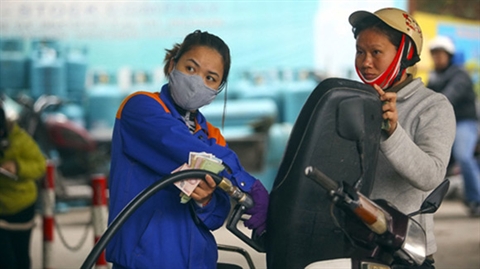
Global petrol prices have tumbled as a result of the crude oil price decrease, but the price in Vietnam has dropped only to VND19,930 per liter, compared to the petrol price in the US, at VND14,700 per liter.
According to Daily Fuel Report, the petrol price in the US has dropped by 28 percent.
In late August, MOF stated that the petrol import tariff would be stable at least until the end of 2014. However, in an unexpected move, MOF on December 5 raised the import tariff by 9-10 percent.
The petrol import tariff has been raised from 18 percent to 27 percent, diesel from 14 percent to 23 percent, kerosene from 16 percent to 26 percent and mazut from 15 percent to 24 percent.
The MOF’s move means that the petrol price will not see further sharp decreases.

Consumers were confused why the ministry made such a move until Tuoi Tre newspaper reported that it was the petrol importers who proposed to raise the tariffs.
PV Oil, for example, on December 6, sent a dispatch to MOF, complaining that the continued price decrease had badly affected its business performance.
PV Oil said the cost price had become higher than the selling price. The problem was that it had to buy petroleum products in large quantities, equal to 30-day sales as requested, when the prices were higher.
The petroleum importer predicted that it would not make a profit in 2014 and that it had been incurring losses since August 2014.
PV Oil’s CEO Nguyen Anh Toan, who signed the dispatch to MOF, suggested raising the import tariff by 5-7 percent to help enterprises stabilize their business and increase state revenue.
Many other petroleum product distributors, including Binh Son Company, which is running the Dung Quat Oil Refinery, Saigon Petro, and Petrolimex Saigon have also complained they are incurring losses, according to VnExpress.
Meanwhile, Bui Ngoc Bao, chair of Petrolimex, the distributor that holds 70 percent of the market share, also said the corporation can foresee that it would incur losses in 2014.
Bao said there was no need to criticize MOF for “breaking a promise”. In principle, the petrol price must be set in a way so as to benefit the State, petroleum distributors and consumers. Taxes and fees account for 35 percent of the petrol price.